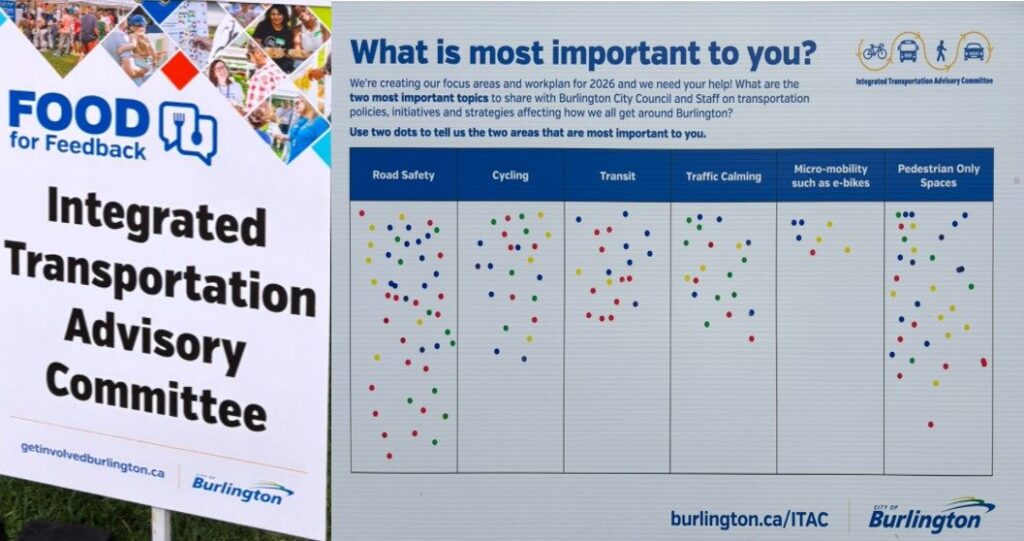Introduction
Why does the City of Burlington require 6 Committees, 9 Boards and 10 Advisory Committees to help administer its affairs? I was left asking myself this question as I reviewed the city’s webpage dedicated to this subject.
According to the City’s website, the City seeks citizens to “…play a key role in providing advice and feedback to Council and staff on a variety of issues”.
https://www.burlington.ca/en/council-and-city-administration/committees-and-boards.aspx
On the surface, I don’t have a problem with this. Residents who are looking to make a difference and feel they have the time, energy and knowledge to contribute can apply to the City Clerk’s office when there is a vacancy and, in turn, are evaluated and/or interviewed to determine their suitability. If they are successful, then the resident is appointed for a term of office, usually three years, and they sit on a committee alongside city staff, one or two council members, and perhaps other officials.
Their duties and responsibilities are detailed in a comprehensive and well-written 32-page document entitled “Handbook for Advisory Committees”, which addresses a whole host of issues. Seems complete, right? Or is something missing? According to the handbook, the city has five standing committees, which include the councillors plus the mayor. Standing committees “review staff reports and make recommendations to council on matters within their jurisdiction” (page 6). Then there are advisory committees. There is one dealing with seniors, another dealing with sustainable development, another focusing on downtown parking, etc. Ten in total. Some of these committees purportedly have sub-committees, and the potential exists for working groups.
The handbook outlines the Code of Conduct, training program, and the list of responsibilities and obligations committee members are expected to meet. There are city officials who are designated as liaisons, as well as council members. Details on how the meetings are to be conducted are also provided. All very formal.

Is This Really Engagement?
The challenge I have relates to the independence of Advisory Committees. If Advisory Committees are expected to function as sources of independent counsel and feedback, how can they do this under the auspices and control of city officials?
I took a deeper dive into the Agricultural and Rural Advisory Committee because I was curious to see how Burlington, an urban metropolitan community that seems intent on burying every square foot of real estate under a thirty-storey concrete edifice, can claim to support rural interests and the needs of farmers.
This committee has a chair and vice chair, a Council liaison (Councillor Galbraith), a staff liaison, a clerk, and nine members. I looked at their agenda for September 17th. Aside from the usual approval of minutes, there are a couple of update items and a proposed discussion on an Agricultural Action Plan. The Land Acknowledgement is longer than the agenda items.
I then went back and read the Minutes from their June 18th meeting. There were updates about an HRFA Breakfast meeting, the Food For Feedback event, a Niagara Escarpment amendment, and a few other updates. Hardly controversial and very routine.
Intrigued by the amount of time this Advisory Committee spent on providing updates, I checked a couple of other Committee agendas to see if this was a regular pattern. I was looking to see if there were any controversial or substantive issues being discussed:
Here’s the meeting agenda for the Mundialization Committee for September. Seems pretty ho-hum:
At least the agenda and minutes for the Downtown Parking Advisory Committee have a bit more action:
A Blast From the Past
Years ago, long before the advent of councillors’ coffee chats, and back when Mike Wallace was Ward 5 Councillor, he invited me to join his advisory panel. The panel was an informal group of citizens from his ward. All of us were Ward 5 residents, and we all came from different backgrounds and political persuasions. We would meet once a month, and Mike would pick our brains about various issues. Sometimes the topic was development, other times transit, and sometimes it was recreation. Similarly, panel members would use the forum to raise specific concerns about issues that were on our minds. At the end of the year, the forum would disband, and Mike would go and invite another group of citizens to join.
There was no formal agenda for our meetings. There were no minutes. We had no budget. We had no training program. We didn’t even have a recording secretary. We certainly didn’t have a handbook. What we did have, however, were frank and candid discussions. If panel members didn’t like something, we were free to speak up. The discussions were always professional and cordial, and we didn’t need to sign a form, swear an oath or complete a course confirming that we would be respectful.
Some Things Don’t Add Up
In researching this article, I did a lot of digging into past minutes and agendas of the city’s ABC’s.
There are five things about this City’s model of advisory committees that I find very troubling. First, it really is overly structured and bureaucratic. Do we actually need to have the City Clerk, councillors, and other public officials sitting on and participating in these forums? Do they really need to meet monthly?
I understand the necessity of having city officials brief Advisory Committee members on activities, but can’t that be done through an email or report? Do they need to attend every meeting? Do councillors need to attend every meeting?
Second, all this structure channels feedback, but it doesn’t really encourage or promote dissenting viewpoints. Truthfully, this isn’t surprising because the very nature of the committee implies that those who are members are in support of the cause or activity. For instance, we have a Mundialization committee. It’s presumed everyone on that committee agrees that mundialization is a good idea; otherwise, they likely wouldn’t be selected. However, where are the dissenting opinions of those who question the program, or feel it should be pared back? Who represents their interests?
Third, it costs money. In 2022, the City of Burlington budgeted $50,000 for advisory committees. I’m guessing that figure, like everything else, has increased in the past three years. I also suspect that figure doesn’t include the time and effort expended by municipal public servants in communicating with, organizing and meeting with committee members.
Fourth, it seemingly promotes advocacy, not advisory input. There is sometimes a thin line between these two concepts, and I suspect the potential exists for it to be breached by those with access to decision-makers. By contrast, Focus Burlington, of which I am a member, is an advocacy group. Those of us in our organization make no claim to being subject matter experts. We also don’t and won’t accept funding from the city. Our expenses come out of the pockets of our Board members. While we offer advice, sadly, the city usually chooses to ignore it, but that’s the risk of speaking up and expressing what are sometimes unconstrained viewpoints.
Finally, advisory committees are composed of subject matter experts, or at least, people who share an interest in the issue. However, this begs the question: if the City hires, contracts with or engages experts in a particular field, why do we then have to have more experts on an advisory panel? Seems redundant.
Distributive vs. Re-distributive Policy Making
When resources are abundant and growth seems unlimited, governments can afford to be generous in how they allocate public funds. For instance, if we lived in a community where the population was growing 10% annually, tax revenues were pouring into city coffers, businesses were flourishing, and a generous benefactor (a.k.a. the provincial government) was dispensing substantial program grants, we could confer subsidies and supports for a plethora of community programs, causes and initiatives. This is how a distributive model of funding operates. The sky is the limit! Sadly, this is no longer the current reality.

A worsening economy, financial uncertainty, and the threats posed by the Trump tariffs are serious storm clouds that need to be addressed. When budgets are tightened and funding dries up, what one group gets is often at the expense of another. This is the essence of re-distributive funding, and like it or not, this is how monies get allocated.
One only has to look at the political situation in Ottawa for a shining example of how this plays out in real life. The Carney government, in response to pressure from the Trump administration and NATO, has made a commitment to increase Canada’s defence spending substantially to a level of 5% GDP. However, that 5% won’t likely be raised from new tax revenue, but rather, from savings derived from cutbacks in other government programs. The same is true municipally.
The Problem is the Mandate
So, here’s what I think is the problem. The Advisory Committees are focused on their niche. They aren’t looking at the broader picture. They don’t care about whether funding for their program results in cuts to something else. Their goal is to maximize gains for their cause, issue, and supporters. After all, the mandate of Committees is narrowly defined. The Cycling Committee probably doesn’t care if there is traffic gridlock on Appleby Line, or that the traffic lights aren’t synchronized, or if the sidewalks are crumbling. Their focus is on getting more people riding bikes and creating more bike lanes. In truth, who can we blame them?
Moreover, are the issues around which the Advisory Committees are created the ones we should be investigating? For example, the city has an Integrated Transportation Advisory Committee whose mandate is to advise on “…policies, initiatives and strategies affecting all forms of transportation, including cycling, pedestrian travel, transit and driving”. We then have a Cycling Advisory Committee who “… assists, advises, recommends and supports Council in matters related to cycling in the city”. Seems like an overlap to me.
You Get What You Reward
Years ago, I worked in Compensation. A senior manager once shared with me a sage piece of advice: “You get what you reward”. In salary administration, it means that if you pay a premium wage, then often you attract a higher calibre of talent. However, it also has relevance in organizational design. Simply, how you structure a project, a department or a business unit will usually dictate the results you get. If you put a lot of like-minded people in a room, the chances of generating unique, unusual or divergent viewpoints are less likely.
Not surprisingly, what we get in Burlington are committees that promote special projects while preparing shopping lists of pet projects, ideas and programs they would like to see instituted. All well and good, but in a re-distributive governance model, that is no longer practical. As a resident, I don’t really care how many bike lanes cyclists would like. What I expect is a holistic approach to transportation policy, one that serves the needs of different citizens while balancing financial prudence with pragmatism. Indeed, I want and expect civic representatives to balance the needs of divergent populations, not provide every special interest group with what they want merely because they want it.
A Better Route
If the city really believes in grass-roots democracy and engagement, then it might want to consider taking a leaf out of Oakville’s approach to community involvement. One of the things that distinguishes municipal politics there is an abundant network of neighbourhood residents’ associations. The city not only engages regularly with these groups, but it also has a page on its website dedicated to providing contact information and other details.
https://www.oakville.ca/community-events/community-resources/residents-associations
No small wonder, perhaps, that Oakville Mayor Rob Burton, as well as some members of Oakville Council, got their start serving on different residents’ associations. These neighbourhood associations have a broader mandate, a more generalist focus, and a greater interest in holistic policy making than simply perpetuating special interest or sectoral interests. They aren’t strictly controlled by the city, and they aren’t beholden to any entity, body or group.
What is inherently appealing with resident associations is their grass-roots nature, their connection to their neighbourhoods, and an understanding of the need to balance competing interests. If you look at the issues championed by these associations, they range in scope from development projects to parks, recreation, traffic and public safety. Many are funded by membership dues paid by local residents. They manage their affairs independently of municipal influence, and as such, they are free to express divergent viewpoints.
A Final Thought….
Former U.S. General George Patton was once famously quoted as offering this advice: “When everyone in a room thinks alike, nobody is thinking”. I suspect, in the context of advisory committees and municipal engagement, there is an element of truth in this observation.
Admittedly, $50K isn’t a lot of money. I suppose if the city feels this is an effective means of soliciting advice and opinion, then they will likely continue. However, it nevertheless begs the question: if one’s selection to an advisory committee is controlled by the same people who manage the agenda, oversee the work, determine the operating standards, and allocate the budget, how independent is the advice, and are they just a rubber stamp? Personally, I’d prefer to hang with those who believe that engagement is something more than issuing perfunctory approvals and hearing project updates, and where differing opinions are natural, expected and welcomed.
Discover more from Focus Burlington
Subscribe to get the latest posts sent to your email.

Simple to avoid accountability. Management (& leadership) by consensus has reached an epidemic level.